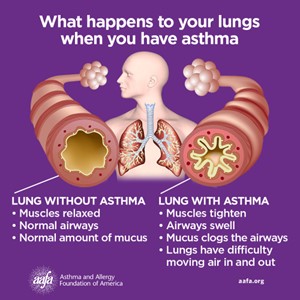A nurse is collecting data from a client who has asthma. Which of the following prescribed medications should the nurse administer first for severe wheezing?
Bronchodilators
Beta blocker
Inhaled steroids
Anti-inflammatory agent
The Correct Answer is A
The nurse should administer bronchodilators first for severe wheezing. Bronchodilators work by relaxing the muscles in the airways, which helps to open them up and make it easier to breathe.
Option b is incorrect because beta blockers are not typically used to treat asthma and can actually worsen symptoms in some clients.
Option c is incorrect because inhaled steroids are used to reduce inflammation in the airways over time and are not typically used for immediate relief of severe wheezing.
Option d is incorrect because anti-inflammatory agents are used to reduce inflammation in the airways over time and are not typically used for immediate relief of severe wheezing.

Nursing Test Bank
Naxlex Comprehensive Predictor Exams
Related Questions
Correct Answer is A
Explanation
Immunocompromised individuals have a weakened immune system, which makes them more susceptible to infections. Soiled linens, when placed on the floor, can potentially harbor pathogens and become a source of contamination. It is essential to handle soiled linens properly by placing them in designated containers or bags to prevent the spread of infectious agents.
Uncapped sharps put in a puncture-resistant container: This is the correct practice for disposing of sharps, such as needles or lancets. Uncapped sharps should always be placed in puncture-resistant containers to prevent accidental injuries and potential transmission of infections.
Dampened cloths used for dusting the area: Dampened cloths for dusting can help minimize the dispersal of dust and allergens, but it does not necessarily pose a significant risk of infection.
However, it is important to ensure that the dampened cloths are properly cleaned and sanitized to prevent the growth and spread of microorganisms.
Waste containers lined with single bags: Waste containers lined with single bags are a common practice for proper waste management and disposal. While it is important to maintain good waste management practices to prevent the spread of infections, the use of single bags alone does not significantly affect the risk of infection for immunocompromised clients.
Correct Answer is C
Explanation
c. Instruct the client to stand up slowly.
Explanation:
The correct answer is c. Instruct the client to stand up slowly.
Prazosin is an alpha-1 adrenergic blocker used to treat hypertension and benign prostatic hyperplasia. One of the common side effects of prazosin is orthostatic hypotension, which can cause a drop in blood pressure when changing positions from lying or sitting to standing.
In this scenario, the client's blood pressure is 100/60 mm Hg, which indicates hypotension. To prevent a sudden drop in blood pressure and related symptoms such as dizziness or fainting, the nurse should instruct the client to stand up slowly. This allows the body time to adjust to the change in position and minimizes the risk of orthostatic hypotension.
Option a, administering a reversal agent, is not necessary in this situation. Reversal agents are used to counteract the effects of specific medications when there is a need to rapidly reverse their actions. There is no indication in the scenario that the client requires a reversal agent.
Option b, initiating cardiac monitoring, is not warranted based solely on a blood pressure reading of 100/60 mm Hg. Cardiac monitoring is typically indicated when there are specific cardiac concerns or symptoms, which are not mentioned in the scenario.
Option d, informing the client to report urinary retention, is a potential side effect of prazosin but is not the most appropriate action to take in this situation. The client's blood pressure is the immediate concern, and addressing orthostatic hypotension by instructing the client to stand up slowly is the appropriate action.
By instructing the client to stand up slowly, the nurse promotes safety and minimizes the risk of orthostatic hypotension, allowing the client to adjust to the change in position and reduce the likelihood of experiencing symptoms related to low blood pressure.
Whether you are a student looking to ace your exams or a practicing nurse seeking to enhance your expertise , our nursing education contents will empower you with the confidence and competence to make a difference in the lives of patients and become a respected leader in the healthcare field.
Visit Naxlex, invest in your future and unlock endless possibilities with our unparalleled nursing education contents today
Report Wrong Answer on the Current Question
Do you disagree with the answer? If yes, what is your expected answer? Explain.
Kindly be descriptive with the issue you are facing.
